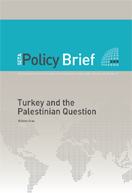Turkish policymakers exhibit a high degree of self-confidence and willingness to pursue intensive diplomatic initiatives in the Middle East. Turkey pursues a multi-dimensional policy line to foster peace and stability in the region, and has already enjoyed some degree of success. Turkish policymakers seek to utilize Turkey’s good relations with Syria and Israel to wield an influence on these countries to facilitate Israeli-Syrian negotiations. The increasing level of trust to Turkey’s new image of civil-economic power in the Middle East and the U.S. support for Turkey’s potential contribution to chronic problems of the region have made Turkey a potential mediator in the decades-long Syrian-Israeli conflict.
In late December 2004, Turkish Prime Minister Recep Tayyip Erdoğan paid an official visit to Syria that abounded with optimistic prospects for future bilateral relations. The visit came after Syrian leader Bashar Assad’s visit to Turkey in January 2004. Assad summarized his official visit to Turkey as follows: “We have together shifted from an atmosphere of distrust to trust.”1 Until the end of the 1990s, official Turkish policy toward Syria could be defined as one of conscious alienation and controlled tension. The changing nature of the relationship, however, is highly commendable if one considers the problematic nature of international relations in the Middle East and the remarkable shift in Turkish foreign policy behavior. Turkey’s two major problems with Syria, particularly during the 1990s, centered on water issues and the activities of the former PKK. Turkey guaranteed a water flow of 500 cubic meters per second to Syria in a protocol signed in 1987. Interestingly, the flow was raised to above 900 cubic meters in the aftermath of Turkey’s crisis with Syria over PKK leader Abdullah Öcalan in October 1998 (when Turkey demanded that the PKK leader be expelled from Syrian territory). During Erdoğan’s visit in December 2004, the Turkish Prime Minister indicated that Syria could make further use of the Tigris waters, which may help put the water problem behind both countries.
Another source of tension between Syria and Turkey was Turkey’s accusation that Syria provided help and shelter to the PKK, which has been at war with the Turkish state for the last two decades. Before the October 1998 crisis, there were suspicions in Turkish policy circles that Syria sought to exploit the Kurdish problem as a leverage against Ankara in the dispute over water and other minor regional issues. At that time, the escalation of nationalist sentiment in Turkey, domestic uncertainties in Syria, Russia’s withdrawal from Middle Eastern politics, and the suitability of the international environment provided Turkey with an opportunity to take action. As tension between Syria and Turkey escalated, Ankara openly began to talk about a military operation against Syria to capture Öcalan and his associates. Egyptian officials engaged in shuttle diplomacy between the two countries. This initiative, and the constructive engagement of other countries in the region such as Jordan, led to the acceptance of Turkish terms by Syrian president Hafez Assad, which was formalized by the signing of the Adana Accord in 1998. Even before acquiescing to Turkish demands, Assad had deported Öcalan.
Prior to signing the Adana Accord, Turkey and Syria had been locked in a relationship shaped by historical enmity, the prevalence of hostile establishment ideologies, and attempts by policymakers to “externalize” certain domestic problems. However, the more recent changes in Turkey’s domestic politics and international orientation have brought with them a greater degree of political maturity, helping to push the country’s national security apparatus to the background. Meanwhile, although change has not occurred in Syria t









